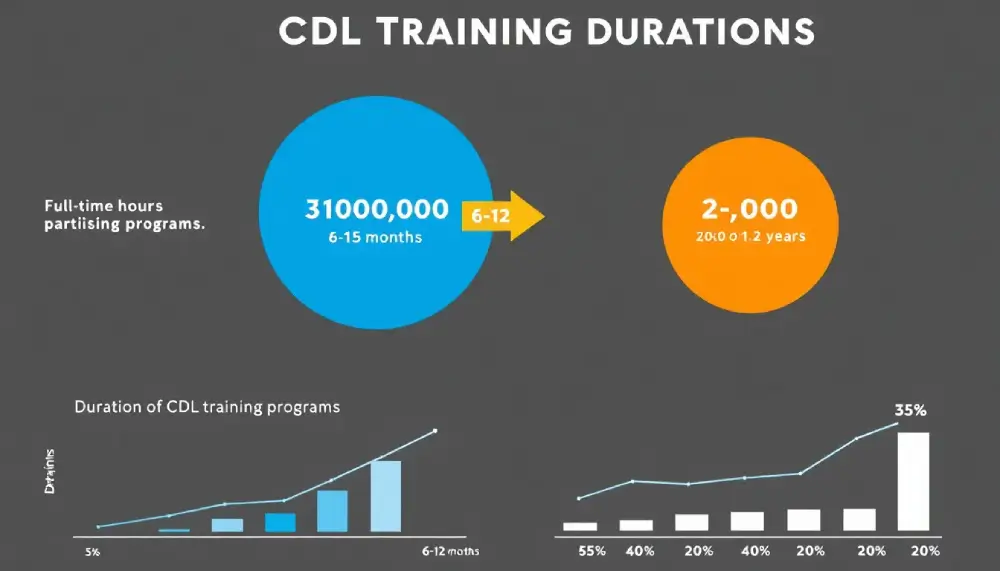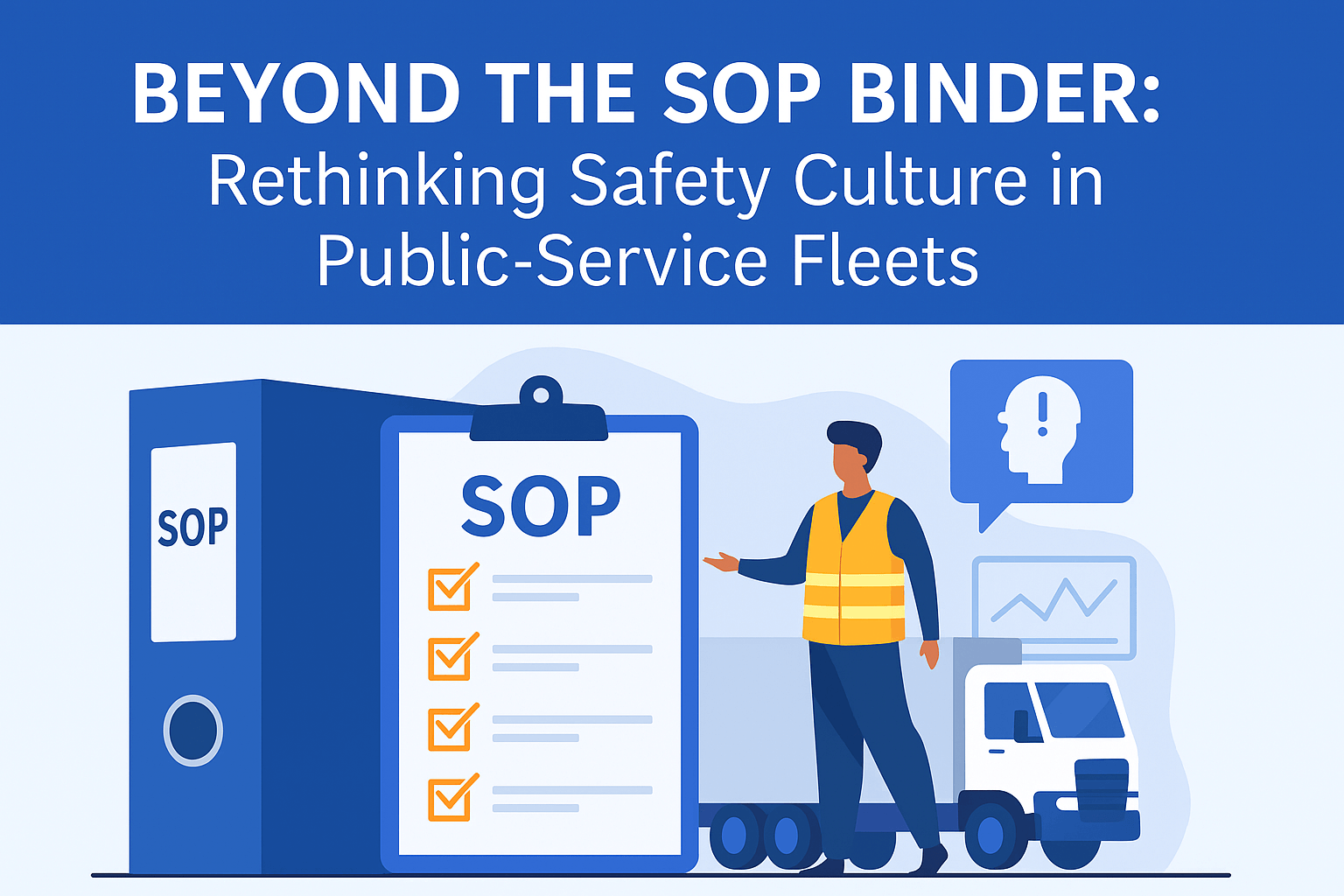
Curious about how long is CDL school? On average, full-time programs range from 3-4 weeks, while part-time courses can stretch over months. In this guide, we’ll dive into the specifics of each type of CDL training and what you can expect.
Table Of Contents
Key Takeaways
- CDL training programs typically last 3-4 weeks for full-time students, although part-time programs can extend over several months.
- Training consists of both classroom instruction and practical road training, covering essential topics like vehicle maintenance and safety protocols.
- Factors such as student ability, program flexibility, and testing schedules can significantly impact the duration of CDL training.
- IMPROV Learning offers FMCSA approved, 100% online CDL training f
Duration of CDL Training Programs

The length of CDL training programs can vary significantly based on the type of training you opt for. Typically, most students can complete their CDL training in about four weeks of full-time attendance.
However, this duration can shift based on whether you choose a full-time, part-time, or intensive training program.
Full-Time CDL Training
Full-time CDL training programs are designed for those who can dedicate themselves entirely to the process. These programs usually span 3-4 weeks and encompass both classroom and road training. The comprehensive approach ensures that students are well-prepared for both the theoretical and practical aspects of the CDL exam. For instance, the CDL-A + Passenger training program requires approximately 4.5 weeks of training.
In these full-time programs, you’ll find yourself immersed in the learning environment, with around 192 hours of instruction spread over 3-6 weeks. This intensive schedule is ideal for those eager to jump-start their trucking careers. The combination of classroom instruction and hands-on road training equips you with the skills needed to become a professional truck driver.
Part-Time CDL Training
For those who cannot commit to a full-time schedule, part-time CDL training offers the flexibility to balance learning with other commitments. These programs can stretch over several months, depending on the student’s availability and pace.
This flexibility makes it possible for individuals to pursue their CDL without having to pause their current job or personal responsibilities.
Intensive CDL Courses
Intensive CDL courses are tailored for those who seek to expedite their training process. Designed to be completed in just a few weeks, these courses provide a fast-track option for those eager to start their trucking careers quickly. The rapid pace of these courses requires a high level of commitment and focus, but they offer an excellent route for swift entry into the trucking industry.
Components of CDL Training

CDL training is a blend of classroom instruction and practical road training at a cdl school, each playing a crucial role in preparing students for their CDL classes and exams. These combined components ensure that aspiring truck drivers are well-versed in both the theoretical knowledge and practical skills required for safe and efficient driving.
Classroom Training
In the classroom, students dive into over 100 hours of instruction covering essential topics such as vehicle maintenance, safety protocols, and commercial driving regulations. The use of humor in these sessions helps to lower anxiety and foster a relaxed learning atmosphere, making complex topics more digestible.
Road Training
Road training offers hands-on experience with commercial vehicles, a critical part of CDL programs. ELDT-compliant truck driving school programs provide practical training that includes both yard exercises and actual driving. This practical component is essential for developing the operational skills necessary for real-world driving scenarios.
Skills Testing
The final component of CDL training is skills testing, where students must demonstrate proficiency in essential skills such as vehicle inspection, basic controls, and actual driving. Successfully completing these tests is crucial for obtaining a CDL, as they evaluate the applicant’s ability to safely operate a commercial vehicle.
Factors Influencing CDL Training Length
Various factors can influence how long it takes to complete CDL training. These include the student’s ability and commitment, the flexibility of the training program, and the availability of CDL testing slots.
Each of these factors can either shorten or lengthen the overall training period.
Student Ability
Students with prior experience in commercial driving or a strong aptitude for learning can significantly reduce their training duration. Individual abilities such as learning speed and adaptability play a crucial role in how quickly students can complete their CDL training.
Program Flexibility
Flexible training programs can adapt to individual schedules, accommodating students with varying time commitments. This flexibility can either shorten or lengthen the training period based on how much time a student can dedicate to their studies.
Testing Schedule
The availability of CDL testing slots can impact the overall timeline for obtaining a license. Delays in testing availability can extend the duration of the training program, as students must wait for an open slot to complete their CDL exams.
Types of CDL Licenses and Their Training Durations

Different types of CDL licenses require varying training durations. For example, obtaining a Class A CDL typically takes longer than a Class B CDL. Each type of license caters to different vehicle categories and job requirements within the trucking industry.
Class A CDL
Training for a Class A CDL generally requires about 3-4 weeks for full-time students. This license allows drivers to operate large trucks and tractor-trailers, making it essential for those seeking to drive the biggest rigs on the road.
Class B CDL
Class B CDL training is typically shorter, taking around three weeks to complete. This license is for operating heavy vehicles that are less than 26,001 pounds, such as dump trucks and smaller commercial vehicles.
Endorsements
Endorsements are additional qualifications that can be added to a commercial driver’s license, allowing drivers to operate specific types of vehicles or transport particular types of cargo.
These endorsements require extra training, which can lengthen the overall training process.
Enhanced Training with IMPROVLearning

IMPROVLearning takes CDL training to the next level by incorporating humor and innovative teaching methods. This approach creates a more engaging and memorable learning experience, helping students retain information better and enjoy their training.
Engaging Classroom Sessions
IMPROVLearning uses humor in its classroom sessions to make learning more enjoyable and effective. This method not only lowers anxiety but also improves retention and engagement among students.
Practical Road Training
Extensive practical road training is a key component of IMPROVLearning’s program. By focusing on real-world driving scenarios, students gain the hands-on experience needed to excel in their new careers.
Job Placement Assistance
IMPROVLearning offers job placement assistance to help graduates find employment in the trucking job industry. This support connects students with potential employers and eases their transition into a new career.
Cost of CDL Training Programs

The cost of CDL training programs can vary widely. Prospective students should consider both tuition fees and additional expenses such as study materials, testing fees, and licensing fees.
Proper budgeting is essential for those trip planning to enroll in CDL training.
Tuition Fees
Typical tuition fees for CDL training programs range from $3,000 to $7,000, depending on the specific school and the duration of the program. Some programs, like IMPROVLearning’s online course, offer more affordable options at around $95.00.
Additional Expenses
Additional costs may include medical exams, study materials, state licensing fees, and endorsement fees. These expenses can add up, so it’s important for students to budget accordingly. For example, study materials can cost between $100 and $500, and medical exams can range from $50 to $200.
Summary
In summary, the duration of CDL training can vary based on the type of program and individual circumstances. From full-time to part-time and intensive courses, each option offers a different path to becoming a professional truck driver. IMPROVLearning’s unique approach enhances the training experience, making it both enjoyable and effective. As you embark on this journey, consider the costs and choose the training program that best fits your needs. The road to a rewarding trucking career is within reach!







